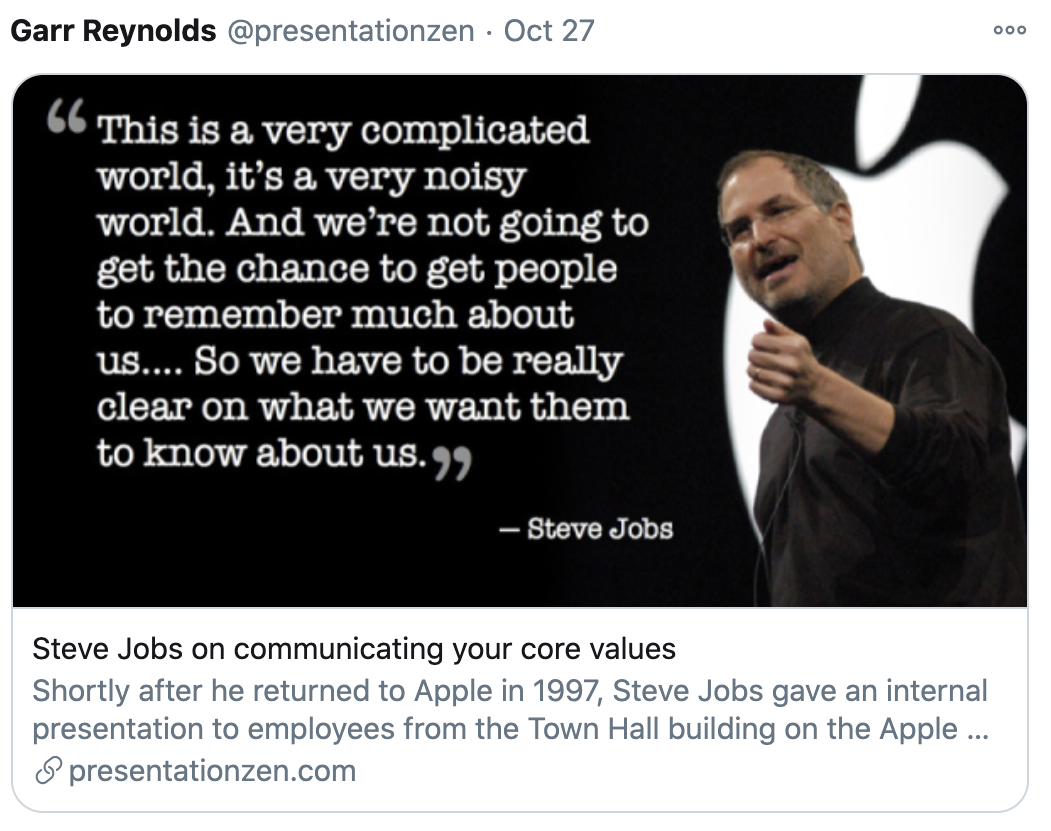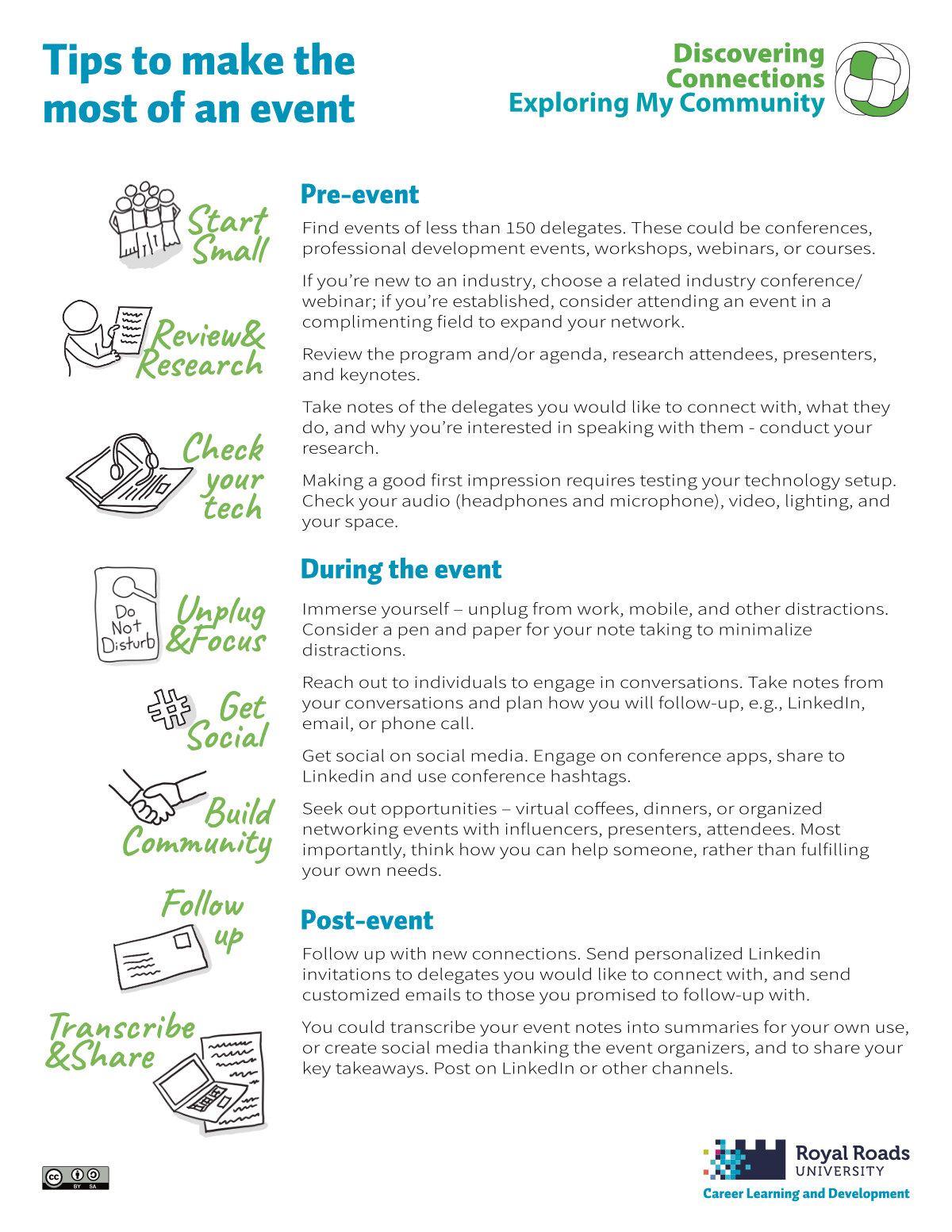Activity: Exploring My Community Resource Map
| Site: | RRU Open Educational Resources |
| Course: | Career Management Resources for Professionals |
| Book: | Activity: Exploring My Community Resource Map |
| Printed by: | Guest user |
| Date: | Sunday, 18 May 2025, 5:17 PM |
Resource Map
You can Click on any of the shapes in the Map to read more information about each topic.
We encourage you to start at the bottom of the interactive resource map with Exploring My Community (above You Are Here). Then work your way up to the top, and from left to right. There is a logical sequence of activities as you work through them in this way.
Alternately, you can select any of the topics directly in the table of contents to the right.
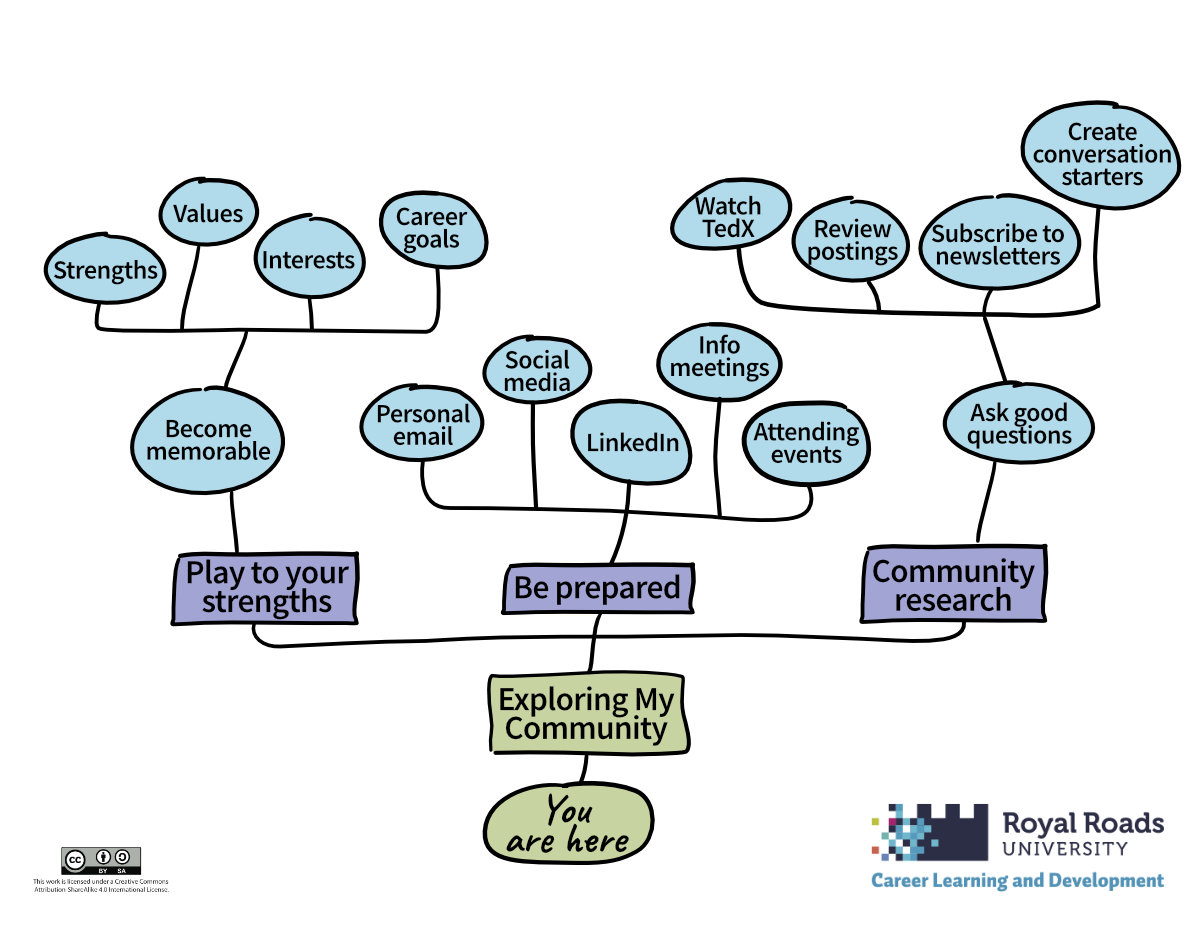
Exploring My Community
Play to Your Strengths
Leverage your strengths based on your personal preferences to grow your community. Experiment. Try one approach. Reflect on what worked, what didn't, and what you'll adjust for the next time.
Equally important—you need to know what your strengths are, as well as your values, interests, and career goals. Why? Because you need to be able to articulate what is unique about you when you meet someone new.
Before you work through this section in the module, take some time to think about what you contributed and what impact you made in your previous roles and to the organizations where you were employed.
If you are challenged by articulating your unique qualities, strengths, and/or assets consider completing the Determining Direction unit.
Become Memorable
- What do you usually share about yourself (e.g., your career story) when you meet someone new, at a Meetup, conference, or professional event?
- What do you want people to know about you, your career, and how you have impacted your industry and the world?
- What are positive results for example from your roles, team development, or projects that you worked on?
- Is it memorable?
For those who are new to a profession or industry, you could also highlight what and/or how you would like to make positive contributions.
To be memorable is to share what is unique about you, as in your professional strengths, values, interests, and goals.
If you know your unique qualities or if you identified your qualities in the Personal Assets module in the Determining Direction unit - continue on. If you haven't completed this module, you could do this one first, or you can refer to the RRU Professional Assets Inventory Workbook.
Credit: Garr Reynold's twitter
Strengths
![]()
Use the provided Exploring My Community Worksheet to complete the following activity. You could also start your own learning journal, or take notes on your computer.
Activity: List your top 5 Strengths.
Choose one of your strengths and write a short story that portrays this strength.
Story Tips:
- What was the situation or challenge you faced?
- What did you do?
- What was the result?
Reflection questions:
- What are your strengths that could be of benefit to others?
- How might your strengths help you build your community? (e.g., writing skills, social skills, sense of humour, positive)
- How do you prefer to connect with people? (e.g., 1-1 meetings, large gatherings, online or offline)
Click here to return to the flowchart ↻
Values
Activity: List your top 5 Core Values.
Choose one of your values and write a short story that illustrates a time when you needed to draw upon this value.
For example, if you were applying to a position at Royal Roads, which holds the values of caring, creative, and courageousthen your story would incorporate an example when you demonstrated one or all of these values in a school project or course, or in one of the roles that you have held.
These stories will be critical for your career search as well as when you are building your community network.
Story Tip:
Stories have a beginning, middle, and end.
Reflection questions:
- How do your values influence how you develop your community?
- Who in your community has similar values?
- What organizations/businesses align with your values?
- How do you navigate situations when others have differing values than yours?
- What values are most important to you in your work life?
Click here to return to the flowchart ↻
Interests
Activity: List your top 5 professional development interests.
Choose one of your interests and write a short story that describes your interest.
Note: Sometimes personal interests can evolve into or influence career pursuits. For example, an individual enjoys playing golf and is pursuing accounting. Many accountants (apparently) play golf—this could be a place to build a network.
Another example, leadership is needed in every sector. Someone who has leadership experience might have an interest in gardening and could consider Lee Valley as a potential place of employment.
One more example, a policy analyst with an interest about mental health and addictions, could look at working in the health care industry.
Story Tip:
What was the spark that inspired you to investigate this interest?
Reflection questions:
- Are there any interests that you have not explored yet? If so, where might you look to find others who have similar interests?
- Have you identified personal or professional workshops or webinars in areas of interest that you would like to take? (e.g., forged axe throwing, kayaking, paragliding, wine tasting, creative writing, or leadership, public speaking)
Career Goals
Activity: List your top 5 Career Goals.
Choose one of your career goals and write a short story about why you chose this career goal, if there are any foreseeable challenges, and how you can mitigate these obstacles.
Story Tip:
Include emotions and passion that you feel about your career goal.
Reflection questions:
- How is your program at Royal Roads furthering your career goals?
- What else could you partake in while you are a student at Royal Roads to help you achieve your goals?
- When you have achieved your career goal, what will the outcome look like, and who, in your community would benefit?
- Who, in your community, might help you move the needle towards achieving your goal(s)?
Write a Summary
A summary or bio story could be incorporated on your social media profiles, e.g., LinkedIn; within a cover letter for a career application; or for an answer during a job interview. Summaries are short and concise - three or four sentences.
There are a couple of routes you can take to develop your summary. Review your four stories for common themes, e.g., one of your core values is sustainability and this value is mentioned in two or three of your stories. Clearly sustainability is important and could be highlighted in your summary. Another route could entail taking one of your stories and refining it.
Summaries developed from your story are powerful because they are unique, personal, and memorable.
Be Prepared
Before reaching out to connect with community, we highly encourage you to take some time to prepare.
Give some time and attention to your signature on your personal email, since it is an opportunity to portray professionalism and can be thought of as a digital business card.
Leveraging social media can be a very effective approach to connect with community - if you choose to engage in this strategy. We highlight LinkedIn as it is a noteworthy tool to grow your community network because it is the "world's largest professional
network with 722+ million members" (LinkedIn, 2020).
Refer to our Resource: Exploring My Community - Social Media Guide for reference, which includes basics about LinkedIn, Twitter, and Instagram. Learn the platforms your industry has adopted and follow their lead or the platform you feel most comfortable with.
We also highlight information meetings (informational interviews) and tips for attending professional events.
LinkedIn is the world's largest professional network with 722+ million members.
If you are reaching out to others from a personal email account to expand your community, we strongly urge you to personalize and professionalize your email signature. Take the opportunity to reinforce your personal brand through a digital business card.
You can add the same information to your email signature as you would on a business card.
Be consistent. Use the same colours, design with your resume, cover letter, and social media platforms.
Here are two examples:
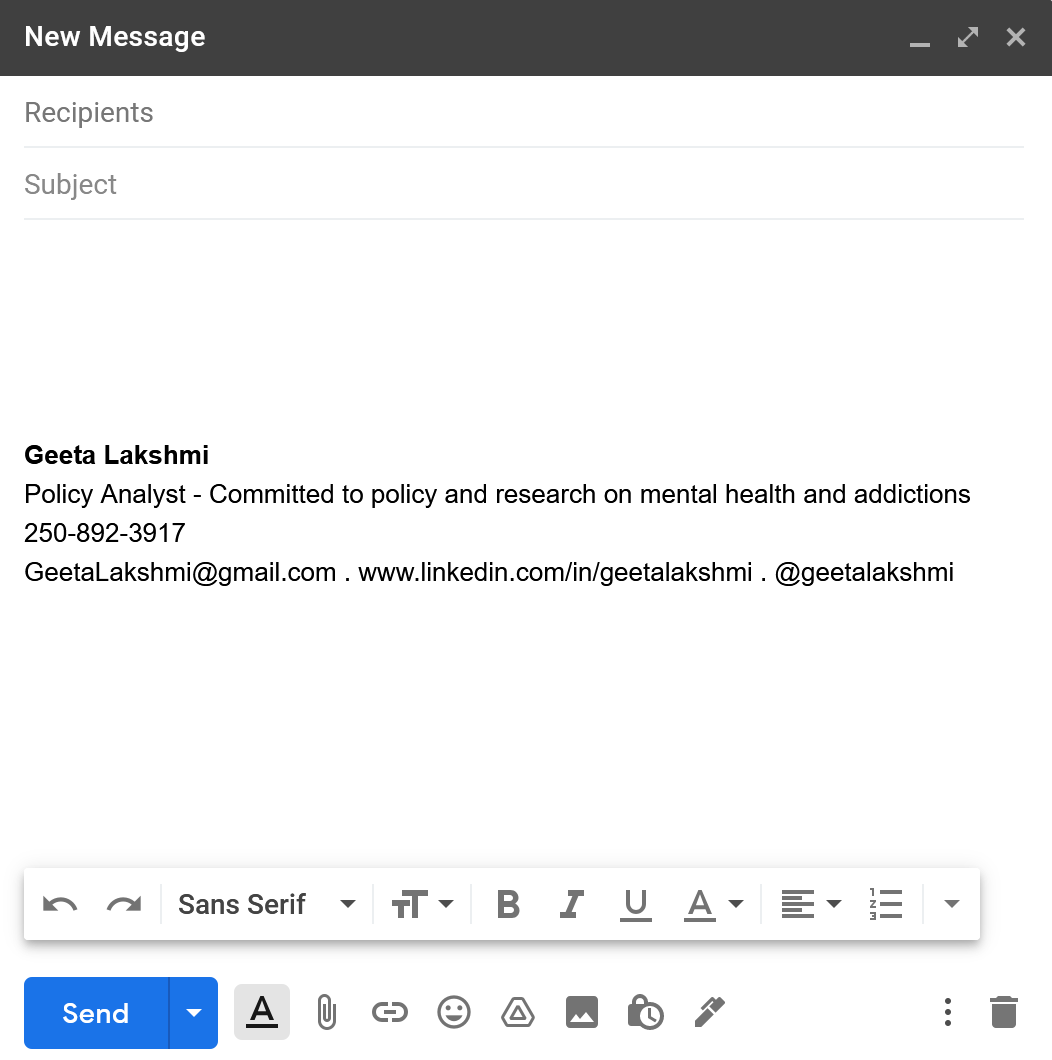
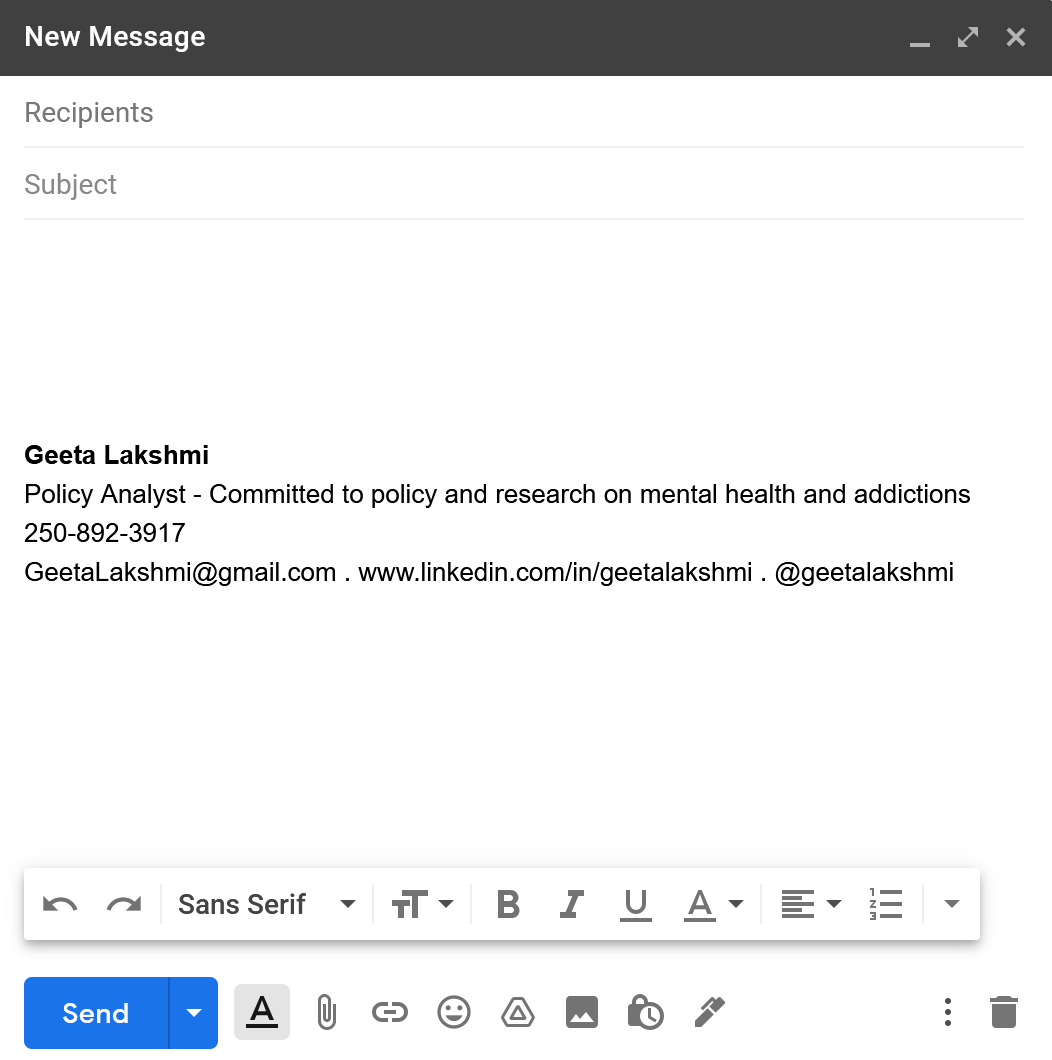
Social Media
We suggest that you download the full version of this graphic as a PDF file.
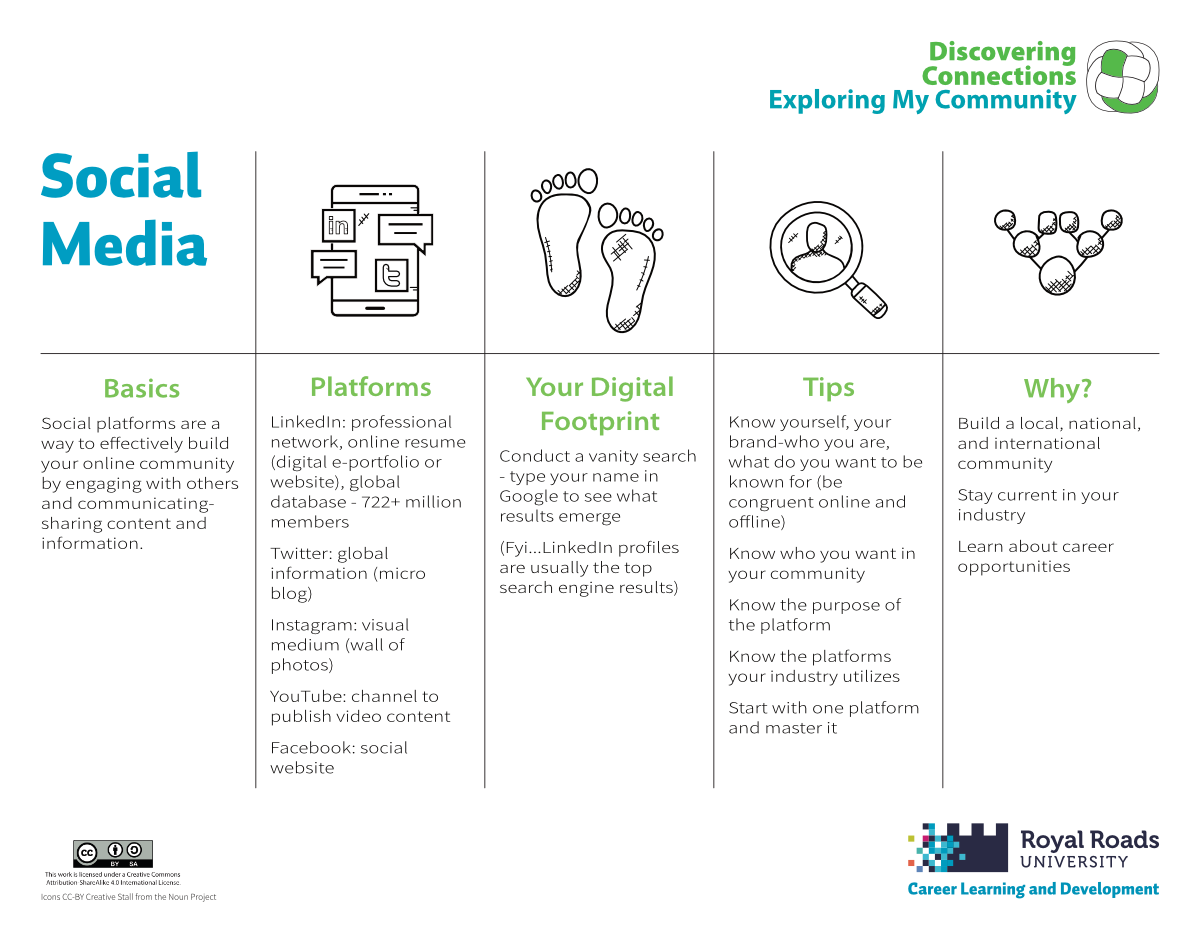
For more detailed information about enhancing your Social Media skills, see the Resource: Exploring My Community - Social Media Guide
Information Meetings
![]()
We suggest that you download the full copy of this graphic as a pdf file.
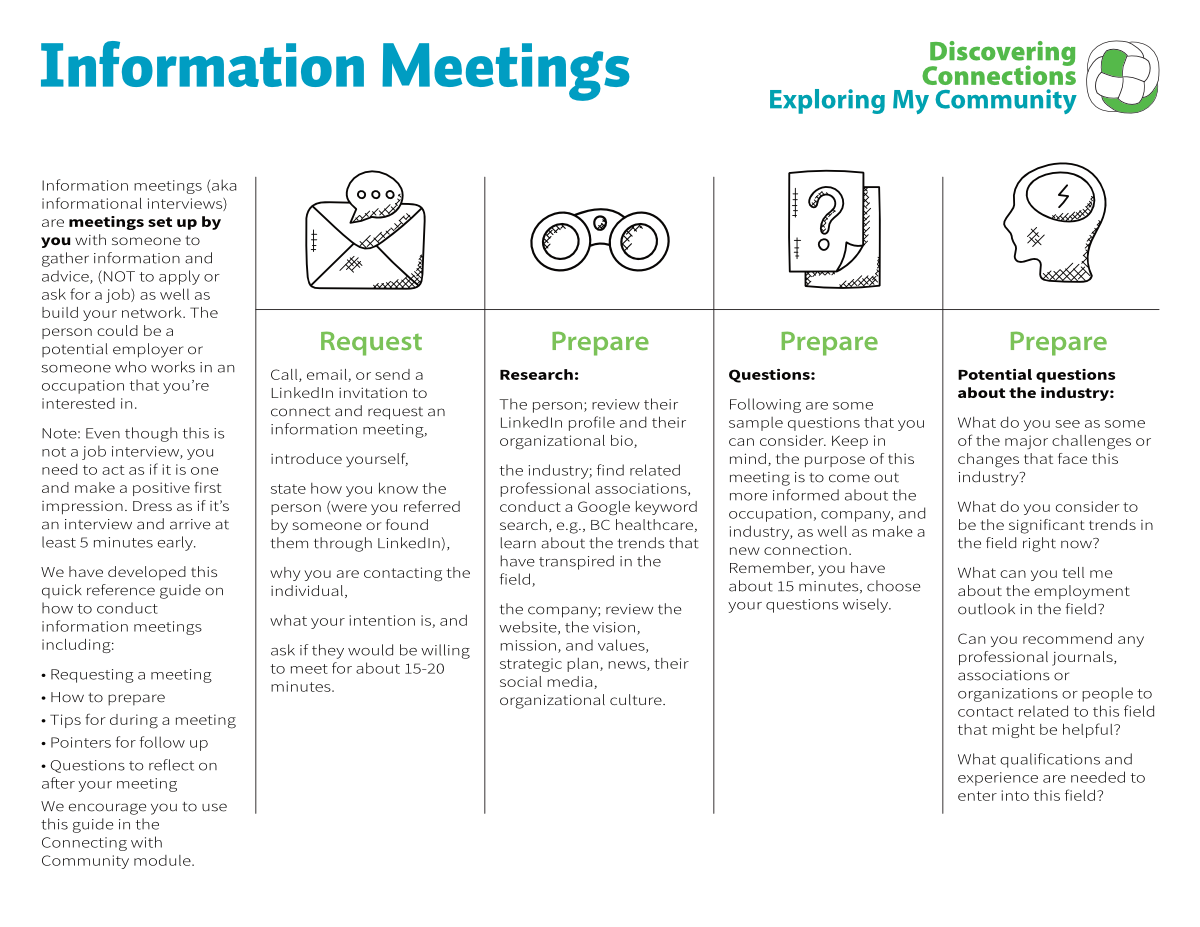
Information Meetings page 2
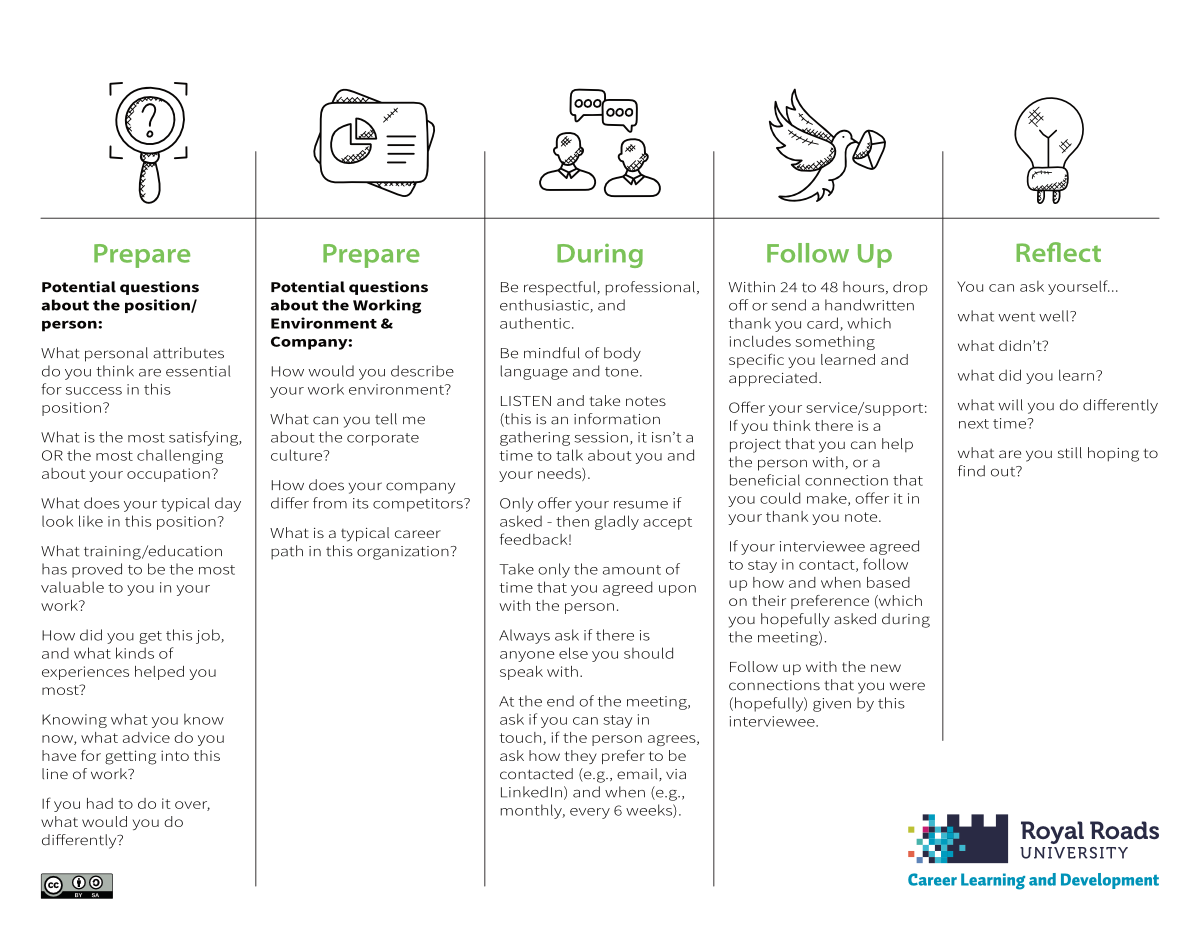
Attending Events
Review our downloadable infographic below that provides tips for connecting with community through attending professional events such as virtual conferences, professional development or professional association events, or workshops (based on article: How to Make the Most of a Virtual Conference.)
Note: Different events have different purposes. For example, usually conferences provide networking opportunities. If you are attending a virtual webinar, you could reach out to attendees in the chat or follow up with a presenter after the webinar.
Community Research
Strongly consider strengthening your conversationalist skills, which in turn will enhance your relationships and human connections.
The following section will provide opportunities to continue to prepare by:
- Following the prompts to watch the TEDx Talk.
- Conducting community research by reviewing relevant job postings and subscribing to industry-pertinent newsletters or LinkedIn feeds.
- Creating a list of conversation starters (thoughtful open-ended questions).
Ask Good Questions
As we refer to asking open-ended questions, it is in the context of building your community network. Think about your purpose, as well as what information are you seeking or want to learn from individuals you meet.
By starting conversations with asking open-ended questions, it gives the other person an opportunity to share. Then listen.
To illustrate, "what projects have you enjoyed working on?" This opens the door for the individual to express freely. Start getting in the habit by asking open-ended questions that start with "what" or "how."
Conversely, closed questions start with when, where, do, and have, which lead to answers with a yes, no, or one-word type responses.
For instance, if you ask, "when did you start at this company?" The person will likely reply with an answer such as "last year" and it stops the conversation very quickly. Another example, "do you have plans to complete your assignments?" The answer would be yes or no.
Questions that start with why tend to put people on the defensive because the answer needs to provide a reason or justification.
Note: An equally invaluable skill as asking thoughtful open questions is, LISTENING. In particular, listening with curiosity, openness, and empathy.
Watch TEDx Video
Omid shares valuable lessons in his TEDx Talk about building meaningful connections.
Here are a few open-ended questions for you to ponder while watching the Talk:
- What are key takeaways that you learned?
- What are positive outcomes that can emerge from asking meaningful questions?
- What are new questions that you could ask the next time you meet someone, rather than the question most people ask, "what line of work are you in?"
TEDx "Breaking the Habit of Small Talk" | Omid Scheybani (11:14)
Review Relevant Job Posting(s)
Activity: Find at least one job posting that you find of interest.
Based on the description about the position and/or the company, what are you curious about?
Develop at least two open questions that you could ask if you were meeting someone in an information meeting.
Subscribe
Activity: Subscribe to industry-pertinent newsletters or LinkedIn groups.
Review at least one industry newsletter and/or a few industry-related LinkedIn posts.
Develop two open questions that you could ask the authors and/or someone at an industry-related event or conference.
Conversation Starters
Now that you’ve watched the “Breaking the Habit of Small Talk" TEDx video, reviewed relevant job postings, and subscribed and started to read industry-relevant posts, we invite you to create your own thoughtful and informed open-ended questions.
Activity: Develop a list of conversation starters.
Here are a few examples from the book, Five For Your First Five: Own Your Career and Life After College (McWilliams, 2017) that you could also adopt or revise—adapt the questions to be authentic for you and appropriate for the situation:
- "What is the biggest lesson you've learned about leadership and how did you learn it?" (p.124)
- "What is the greatest challenge or hurdle you have tried to overcome and what did you do?" (p. 124)
- "When was the last time you were surprised by something/someone? What happened?" (p. 124)
- "How are you taking ownership for your career development?" (p. 13)
- "How do you build skills and experiences that will benefit you in the future..?" (p. 3)
Congratulations! You have reached the last page of the Exploring My Community Resource Map. You can return to the Unit Introduction, or use the button below to keep exploring this activity.
Click here to return to the flowchart ↻Tip: Click exit book below to go back to the main page, or take this shortcut to move directly to the module summary.
